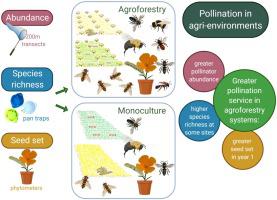当前位置:
X-MOL 学术
›
Agric. Ecosyst. Environ.
›
论文详情
Our official English website, www.x-mol.net, welcomes your
feedback! (Note: you will need to create a separate account there.)
Temperate agroforestry systems provide greater pollination service than monoculture
Agriculture, Ecosystems & Environment ( IF 6.0 ) Pub Date : 2020-10-01 , DOI: 10.1016/j.agee.2020.107031 Alexa Varah , Hannah Jones , Jo Smith , Simon G. Potts
Agriculture, Ecosystems & Environment ( IF 6.0 ) Pub Date : 2020-10-01 , DOI: 10.1016/j.agee.2020.107031 Alexa Varah , Hannah Jones , Jo Smith , Simon G. Potts

|
Abstract Insect pollination is a globally important ecosystem service, contributing to crop yields, production stability and the maintenance of wild plant populations. Ironically, agriculture is one of the major global drivers of wild insect pollinator decline. At the same time, increasing human population is driving ever greater demands on crop production. Agroforestry (AF) – a more diverse farming system integrating woody and agricultural crops – can theoretically reconcile high production with provision of ecosystem services such as pollination. However, empirical studies of pollination in temperate AF systems are almost entirely lacking. We sought to fill this knowledge gap by assessing whether AF can provide increased pollination service compared to monoculture (MC) systems. Six UK sites, each containing an AF and a MC system, were studied over three years. Wild pollinator abundance and diversity were used as proxies for the magnitude and stability, respectively, of the pollinating community. We also directly measured pollination service as seed set in a wild plant phytometer. We found that temperate AF systems can provide greater pollination service than MC: AF treatments had twice as many solitary bees and hoverflies, and in arable systems 2.4 times more bumblebees, than MC treatments. AF also had 4.5 times more seed set compared to MC in one of the two years. At 40% of site-by-year sampling units, species richness of solitary bees was on average 10.5 times higher in AF treatments. This provides evidence in favour of the expectation that AF systems can support higher pollinator richness, and therefore greater potential stability, of pollination service. For the other sampling units, and for bumblebees (Bombus spp.), there was no treatment effect on species richness. Further work is needed to investigate the effect of AF on species richness and its mechanistic basis. Our results also highlight the importance of AF system design, ensuring that ecosystem services outcomes are explicitly planned at the design stage. We suggest that AF has a role to play in improving the sustainability of modern farming and in mitigating the ongoing loss of wild pollinating insects, which is strongly driven by prevailing agricultural practices.
中文翻译:

温带农林业系统提供比单一栽培更好的授粉服务
摘要 昆虫授粉是全球重要的生态系统服务,有助于作物产量、生产稳定性和野生植物种群的维持。具有讽刺意味的是,农业是野生昆虫传粉媒介减少的全球主要驱动因素之一。与此同时,不断增加的人口正在推动对作物生产的更大需求。农林业(AF)——一种将木本作物和农作物结合在一起的更加多样化的耕作系统——理论上可以将高产量与提供授粉等生态系统服务相协调。然而,几乎完全缺乏对温带 AF 系统授粉的实证研究。我们试图通过评估 AF 与单一栽培 (MC) 系统相比是否可以提供更多的授粉服务来填补这一知识空白。六个英国站点,每个站点包含一个 AF 和一个 MC 系统,学了三年。野生传粉媒介的丰度和多样性分别被用作传粉群落规模和稳定性的代表。我们还直接测量了授粉服务作为野生植物植物光度计中的种子。我们发现温带 AF 系统可以提供比 MC 更好的授粉服务:AF 处理比 MC 处理有两倍的孤独蜜蜂和食蚜蝇,在可耕种系统中大黄蜂是 MC 处理的 2.4 倍。在两年中的一年中,AF 的种子集也比 MC 多 4.5 倍。在 40% 的逐年采样单位中,单蜂的物种丰富度在 AF 处理中平均高出 10.5 倍。这提供了支持 AF 系统可以支持更高的传粉媒介丰富度并因此更高的传粉服务潜在稳定性的预期的证据。对于其他抽样单位和大黄蜂(Bombus spp.),对物种丰富度没有处理影响。需要进一步的工作来研究 AF 对物种丰富度的影响及其机制基础。我们的结果还强调了 AF 系统设计的重要性,确保在设计阶段明确规划生态系统服务成果。我们建议 AF 可以在提高现代农业的可持续性和减轻野生授粉昆虫的持续损失方面发挥作用,这在很大程度上受到普遍农业实践的推动。确保在设计阶段明确规划生态系统服务成果。我们建议 AF 可以在提高现代农业的可持续性和减轻野生授粉昆虫的持续损失方面发挥作用,这在很大程度上受到普遍农业实践的推动。确保在设计阶段明确规划生态系统服务成果。我们建议 AF 可以在提高现代农业的可持续性和减轻野生授粉昆虫的持续损失方面发挥作用,这在很大程度上受到普遍农业实践的推动。
更新日期:2020-10-01
中文翻译:

温带农林业系统提供比单一栽培更好的授粉服务
摘要 昆虫授粉是全球重要的生态系统服务,有助于作物产量、生产稳定性和野生植物种群的维持。具有讽刺意味的是,农业是野生昆虫传粉媒介减少的全球主要驱动因素之一。与此同时,不断增加的人口正在推动对作物生产的更大需求。农林业(AF)——一种将木本作物和农作物结合在一起的更加多样化的耕作系统——理论上可以将高产量与提供授粉等生态系统服务相协调。然而,几乎完全缺乏对温带 AF 系统授粉的实证研究。我们试图通过评估 AF 与单一栽培 (MC) 系统相比是否可以提供更多的授粉服务来填补这一知识空白。六个英国站点,每个站点包含一个 AF 和一个 MC 系统,学了三年。野生传粉媒介的丰度和多样性分别被用作传粉群落规模和稳定性的代表。我们还直接测量了授粉服务作为野生植物植物光度计中的种子。我们发现温带 AF 系统可以提供比 MC 更好的授粉服务:AF 处理比 MC 处理有两倍的孤独蜜蜂和食蚜蝇,在可耕种系统中大黄蜂是 MC 处理的 2.4 倍。在两年中的一年中,AF 的种子集也比 MC 多 4.5 倍。在 40% 的逐年采样单位中,单蜂的物种丰富度在 AF 处理中平均高出 10.5 倍。这提供了支持 AF 系统可以支持更高的传粉媒介丰富度并因此更高的传粉服务潜在稳定性的预期的证据。对于其他抽样单位和大黄蜂(Bombus spp.),对物种丰富度没有处理影响。需要进一步的工作来研究 AF 对物种丰富度的影响及其机制基础。我们的结果还强调了 AF 系统设计的重要性,确保在设计阶段明确规划生态系统服务成果。我们建议 AF 可以在提高现代农业的可持续性和减轻野生授粉昆虫的持续损失方面发挥作用,这在很大程度上受到普遍农业实践的推动。确保在设计阶段明确规划生态系统服务成果。我们建议 AF 可以在提高现代农业的可持续性和减轻野生授粉昆虫的持续损失方面发挥作用,这在很大程度上受到普遍农业实践的推动。确保在设计阶段明确规划生态系统服务成果。我们建议 AF 可以在提高现代农业的可持续性和减轻野生授粉昆虫的持续损失方面发挥作用,这在很大程度上受到普遍农业实践的推动。











































 京公网安备 11010802027423号
京公网安备 11010802027423号